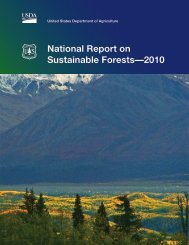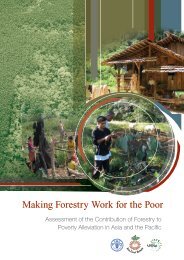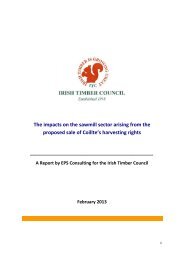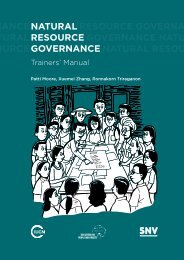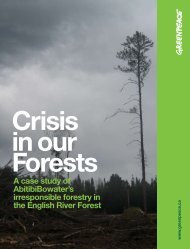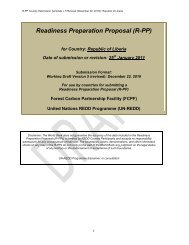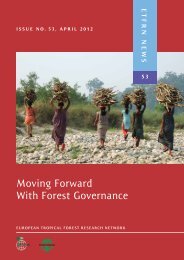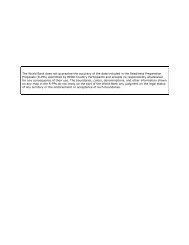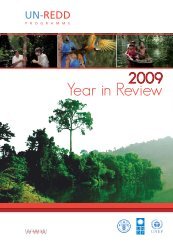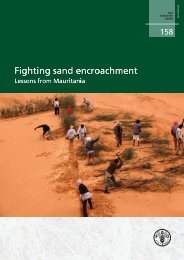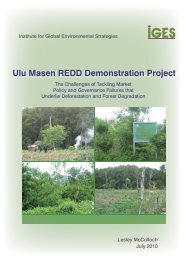pdf 1242 KByte - JIKO
pdf 1242 KByte - JIKO
pdf 1242 KByte - JIKO
Create successful ePaper yourself
Turn your PDF publications into a flip-book with our unique Google optimized e-Paper software.
Policy Paper: Assessing prerequisites for market-based REDD+ activities 14<br />
2. setting an institutional framework for MRV,<br />
3. dealing with forest tenure and carbon rights and<br />
4. overseeing safeguards and establishing national standards.<br />
In the following, these main tasks of national institutions will be presented and implications be discussed.<br />
3.2.1 Overall Responsibility and Coordination<br />
In REDD+ countries, overall responsibility for REDD+ and its implementation lies with the national government.<br />
Coordination could therefore be assigned to the highest level possible or alternatively be assigned<br />
to a ministry, a task force or commission. Tasks would comprise, but are not limited to the development of a<br />
national REDD+ strategy and its implementation as well as the communication with relevant stakeholder<br />
groups and ministries. This can be particularly challenging due to the potentially conflictive interests of the<br />
stakeholders involved when activities are implemented across sectors (Vatn / Angelsen 2009).<br />
Furthermore, a national REDD+ focal point should be established for coordinating relations between the<br />
national REDD+ implementation and the international REDD+ mechanism. In a market-based approach, the<br />
national institutions would further have to oversee relations with the international carbon markets. If REDD+<br />
actions would be implemented at the subnational level, REDD+ countries would need to appoint a specific<br />
national REDD+ authority and develop approval criteria that take into account national priorities and the<br />
legislative context (Streck et al. 2009).<br />
3.2.2 Institutional Framework for MRV<br />
REDD+ countries need to designate one or more entities responsible for the collection of data necessary for<br />
measurement, reporting and verification. These entities can be new public agencies or be built by recurring<br />
to existing organisations. Entities should be established at a high level in the hierarchy and receive full support<br />
from the entity responsible for coordinating REDD+ activities and the government (Chagas et al. 2011).<br />
Existing capacities have to be carefully assessed before decisions on establishing new institutions can be<br />
made. Furthermore, vertical coordination as well as international cooperation to bundle capacities may be<br />
useful (Bernard / Minang 2011).<br />
3.2.3 Dealing with Forest Tenure and Carbon Rights<br />
REDD+ is about changing the conventional way in which people use forests. This makes it necessary to have<br />
clearly defined forest tenure structures in countries where REDD+ activities will be implemented, since “forest<br />
tenure determines who can use what resource, for how long and under what condition” (Streck 2009 p.<br />
154). In most developing countries, however, forest tenure is not clearly defined or at least not formalised<br />
and there is a considerable gap between formal right holders and actual land users (Savaresi / Morgera 2009).<br />
Claims are often contested between the state and civil society, with the state often claiming statutory ownership<br />
rights over most forests and not recognising forest dwellers’ claims of customary rights. Furthermore,<br />
claims are often overlapping between companies and forest dependent peoples, with the latter frequently<br />
being the less powerful and thus less successful claimant (Sunderlin et al. 2009).<br />
Clarification of tenure is not only a prerequisite for implementing forest protection activities in general<br />
terms, but it is also of pivotal importance to protect forest dependent people whose rights may be threatened<br />
through those activities. This particularly concerns landless people, who are among the poorest segment of<br />
Nicolas Kreibich, Christof Arens and Wolfgang Sterk<br />
Wuppertal Institute




